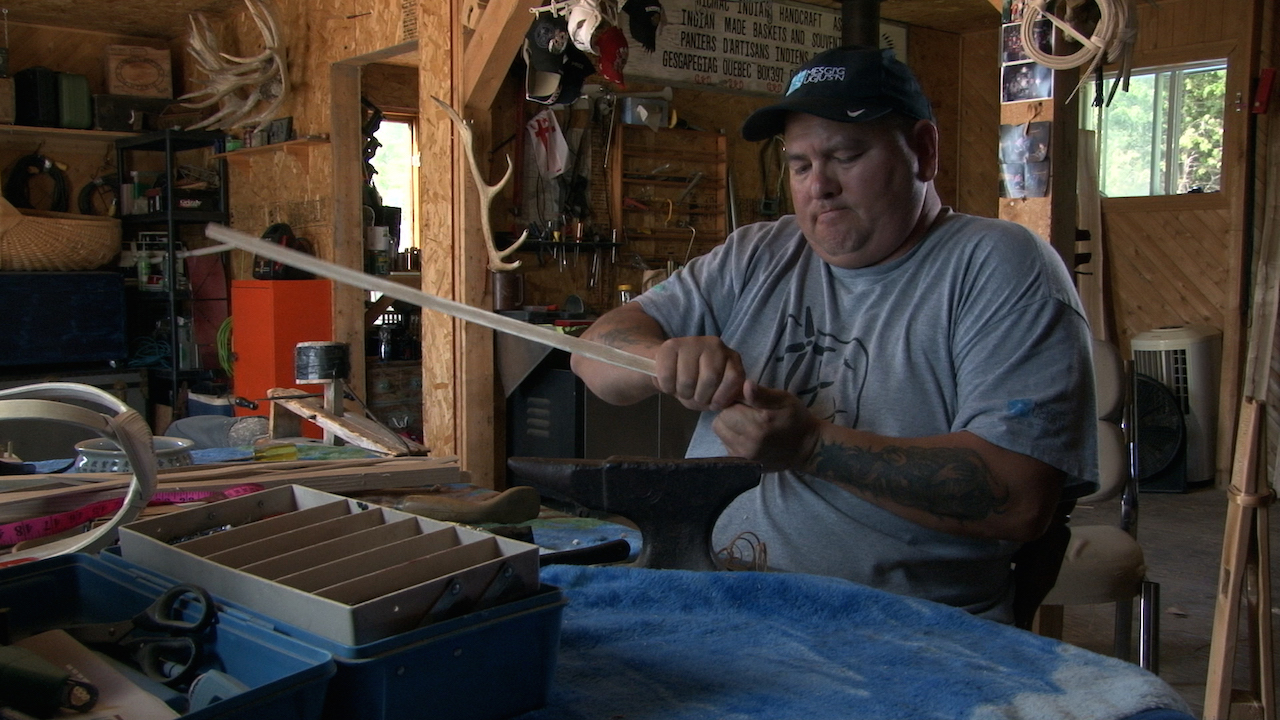Audiences seem to gasp at the finish of the six-minute documentary My Father’s Tools, unaware the whole piece is about an ancestral art form that is dying out. It begins with a man in the forest, searching for and then cutting down a tree.
“People are surprised at the end — they don’t seem to know what’s happening most of the way through [and then realize] he’s making baskets!” director Heather Condo tells me in a phone interview from her home in Gesgapegiag, about a six-hour drive northeast of Quebec City.
The first-time filmmaker, who was born in Quebec in 1971 but was adopted and grew up in Massachusetts, is Mi’gmaq. She is delighted with the route her short film has taken: first screening at Percéides Festival in Gaspésie, then an international premiere at Sundance last winter, to screenings in more than 50 festivals including Berlinale, Cannes, ImagineNATIVE and DOXA.
Now, it also holds another honour: the first-ever film made by an Indigenous person selected for Vimeo’s Staff Picks Premieres channel, which launched a year ago.
Condo, who lived in a predominantly white community in the U.S. until moving back to Quebec in 2005, wanted to highlight the work of her partner, Stephen Jerome, who is the last man in the Gesgapegiag community to make black ash rib baskets.
“I’m pretty familiar with the process,” she said. “I’ve been in the woods with him and he’s shown me how to pick a tree, how to smell a tree.”
Condo says a rotten tree smells like mushrooms while a “good one” smells “like a really good wine, a sweet wine.”
Done in cinema vérité style, there is no speaking, just the sound of Jerome traipsing through the sunny forest, cutting down wood and then back in his workshop doing the long, hard craftsmanship of shaving and weaving the wood. It’s meditative and immersive.
“I wanted it to be just him, so you feel like you are watching him, just like I’ve been watching him for so long.”
Originally, she had envisaged a one-hour film but didn’t realize the amount of labour that would take. Condo’s son, Zachary Greenleaf, is also a filmmaker and was the sound person on the project.
“It took eight hours total over a few days [and] the editing took just as long,” explained Condo. “It was so hard because I had to take a few steps in [the process of weaving] out.”
Jerome loved the film upon seeing it, said Condo, but was also a little sad a few steps were cut out.
“There’s a part he calls the ‘ears’ — these flaps where the whole basket is gathered together and he covers them. He loves that part but it didn’t flow…I had to pick and choose what ended up in the film.”
The documentary was co-created with Wapikoni Mobile, a travelling audiovisual and music production studio dedicated to Indigenous youth. Wapikoni has helped make 1,000 short films since its inception in 2004.
Condo is eager to make another film and is developing a longer version of her documentary. So far, she and Jerome have gotten lots of support from the people in surrounding communities who have visited them and invited them for screenings or for Stephen to sell his baskets.
“There’s a lot of appreciation,” noted the director. “The work speaks for itself. It unfolds just like that with Stephen alone in the woods when no one is there.”
One of her favourite moments is of Jerome sitting on his wood horse, shaving the wood to make the strips but the viewer is looking down at his back.
“My son came up with that shot. It’s intimate…you feel like you’re present there, quietly observing him.”
Watch the film here.
June Chua is a Berlin-based journalist who regularly writes about the arts for rabble.ca.
Image courtesy of Wapikoni Mobile




